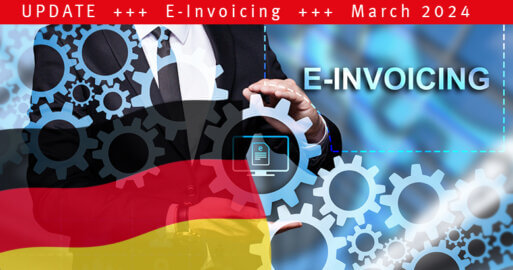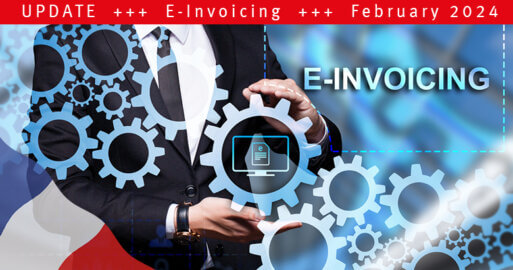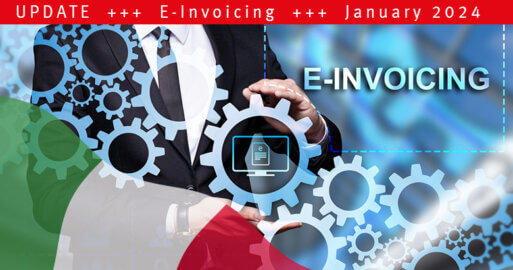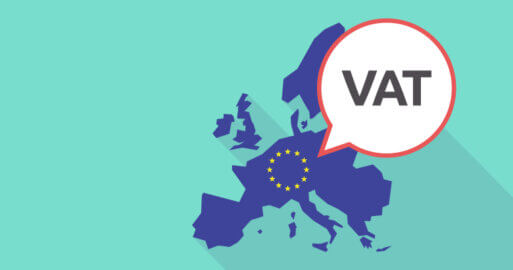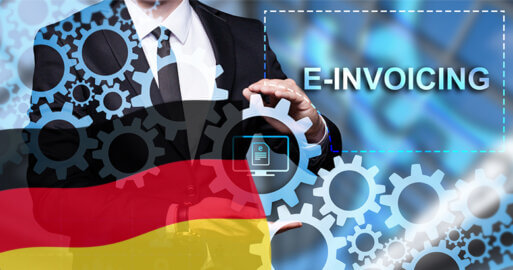Plans Are Being Discussed to Introduce a B2B E-invoicing Mandate in Germany
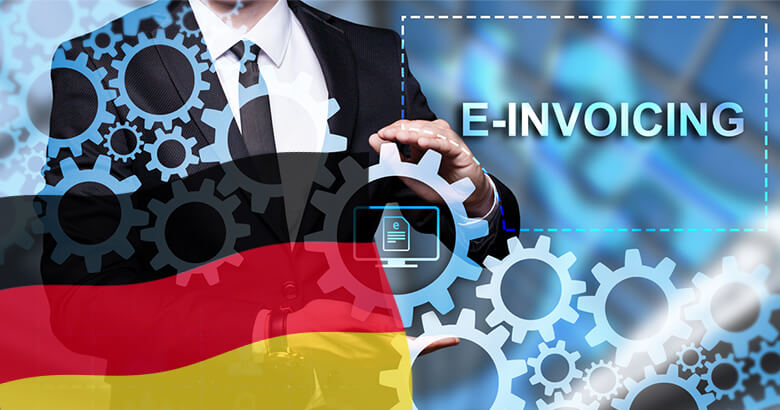
An e-invoicing mandate is being discussed in Germany for the B2B sector. Should this plan come into effect, e-invoicing will become mandatory before the e-reporting system is in place. The e-invoicing mandate is expected to be phased in and to be in line with the EU directive ViDA – VAT in the Digital Age. Read on to get the latest information.
In a letter dated 17 April 2023, the German Federal Ministry of Finance (abbr. BMF) informed associations that they were planning to introduce mandatory e-invoicing for domestic B2B transactions in Germany. This proposal, currently under discussion, would be equivalent to an e-invoicing mandate for the German B2B sector.
In order to take into account the concerns of the business community and the tax advisory professions beforehand, the Federal Ministry of Finance has invited comments on the proposal until 8 May 2023.
This proposal follows the pledge made in the German government’s coalition agreement¹ to fight VAT fraud in Germany, and to introduce an electronic reporting system for creating, verifying and routing invoices as soon as possible.
The BMF is in favour of starting with an e-invoicing mandate for domestic B2B transactions, even before the actual e-reporting system is in place.
What are the key points in this proposed B2B e-invoicing mandate?
The proposal to introduce an e-invoicing mandate in Germany of April 17 2023, and currently under discussion, contains the following points:
- Limiting the e-invoicing mandate to domestic B2B transactions.
- Creating a new e-invoice definition based on the EN 16931 standard from the European Committee for Standardization (abbreviated to CEN) and the ViDA legislative proposal.
- Categorizing paper invoices and e-invoices that do not meet the new requirements as “other invoices”.
- Downgrading the supremacy of paper invoices currently in 14 para. 1 of the German Vat Code.
- Redefining invoice issuing obligations currently in 14 para. 2 of the German Vat Code.
- Carrying over the statements on the “authenticity of the origin of the invoice, the integrity of its content and its readability” within § 14 of the German Vat Code.
These key points involve changing paragraph § 14 of the German Vat Code, which also requires discussion.
What is the proposed schedule for phasing in the German B2B e-invicing mandate?
The current proposal is to start introducing the e-invoicing mandate for domestic B2B transactions from 1 January 2025.
The following options are available to phase in the mandate while relieving the burden on SMEs:
a) A phased introduction by company size
In the first year, small and medium-sized enterprises would need to consent to receiving electronic invoices. In the second year, consent would only be required from small businesses. From the third year onwards, e-invoicing would be introduced across the board.
b) A phased introduction by invoice amount
The e-invoicing mandate would only apply above a certain threshold, such as 50,000 euros in the first year and 30,000 euros in the second year. There would be no threshold from the third year onwards.
c) A phased introduction using other criteria
The mandate to receive e-bills could apply from day one. However, the obligation to issue e-bills, on the other hand, would only come into effect later for small and medium-sized businesses. This system of staggering introduction has already been used to introduce e-invoicing and e-reporting in France.
It remains to be determined which invoices should be exempt from the e-invoicing mandate, either in the introductory period or on a permanent basis. Candidates for exemption may include micro invoices as per § 33 of the German VAT implementation ordinance (UStDV) or proof of travel as per § 34 UStDV.
How does creating and introducing an e-reporting system fit into the proposed schedule?
Creating and introducing an e-reporting system is an integral part of the e-invoicing mandate as set out in the German government’s coalition agreement.
The only difference is that the mandate itself is being introduced in Germany before the reporting system, therefore creating the need to implement the reporting system.

How will the proposed e-reporting system for Germany be aligned to the EU directive ViDA – VAT in the Digital Age?
The ViDA EU proposal only stipulates that intra-community B2B transactions need to be e-reported from 1 January 2028. In Germany, the plan is to create a reporting system that fulfils both domestic and EU requirements in order not to burden the business world twice. This means that the reporting system will deal with the following transactions:
- Domestic B2B transactions (as per the German government’s coalition agreement)
- Cross-border B2B transactions (as per EU-ViDA)
Germany is therefore coordinating with the EU to implement their domestic reporting system.
What is the proposed data flow for future e-invoices and reporting data?
The invoice issuer’s e-invoicing platform checks the plausibility according to EN16931, extracts the reporting data from the invoice and reports it to the state portal. Subsequently, the invoice issuer’s e-invoicing platform sends the invoice to the recipient’s e-invoicing platform. This means that the reporting data is sent to the tax authorities at the same time as the actual invoice is sent. Invoice data exchange may occur on either a private or governmental e-invoicing platform.

When transmitting data to the reporting system, taxable entities only electronically transmit certain invoice data (known as reporting data) to the tax authorities. Currently, there are no plans in Germany to transmit the complete e-invoice to the tax authorities.
Once the reporting system is in place, invoice data can be transmitted either via the
- Government’s e-invoicing platform
or a
- Private e-invoicing platform that meets official specifications
SEEBURGER supports you in the implementation of e-invoicing and reporting systems
As an experienced provider of e-invoicing solutions, we help you to implement the necessary e-invoicing and reporting system requirements in a simple and standardized way. In addition to EDI, ZUGFeRD, FacturX, XRechnung and Peppol for Germany, SEEBURGER also covers global e-invoicing requirements and offers on the one hand a flexible, ERP-independent solution, and on the other hand deep process integration in SAP with a high level of user convenience for processing incoming and outgoing invoices due to excellent SAP expertise. This includes, for example, the seamless integration of SAP S/4HANA.
The SEEBURGER Invoice Delivery Service lets your customers and business partners securely send you invoices in the EN16931-based ZUGFeRD, Factur-X and XRechnung formats, including over Peppol. Legally compliant, this works with any ERP system.
The SEEBURGER Invoice Portal Service processes incoming e-invoices in a seamless, automated workflow, from receipt to entry in a ledger and transfer to any ERP system.
Webcast-On-Demand
New E-Invoicing Requirements for 2024 and Beyond
Stay up-to-date with all e-invoicing requirements.
Watch now¹ Koalitionsvertrag 2021-2025, S. 132. (abgerufen am 24.04.2023).
Thank you for your message
We appreciate your interest in SEEBURGER
Get in contact with us:
Please enter details about your project in the message section so we can direct your inquiry to the right consultant.
Written by: Rolf Wessel
Rolf Wessel has been product manager at SEEBURGER for software applications and services for electronic business data exchange since 2010. His focus is on solutions for SAP, electronic invoicing (e-invoicing) and innovations for the digitalization of business and technical business processes. The Forum elektronische Rechnung Deutschland (FeRD) appointed Rolf Wessel as an expert. As project manager at the United Nations Centre for Trade Facilitation and Electronic Business (UN/CEFACT), he develops international trade facilitation and establishes standards for electronic business processes. Furthermore, he represents the German delegation of the FeRD at the Franco-German workshop with the Forum National de la Facture Electronique (FNFE) and thus supports the government initiative for international standardization and harmonization of e-invoicing processes. He is a member of the working committee "Electronic Business" at the German Institute for Standardization. (DIN) and Association for Electronic Invoicing (VeR). Rolf Wessel graduated in business informatics (FH) with a focus on financial management and production planning. After working in the electrical, financial, consumer goods, software and mineral oil industries, he had been a systems analyst and IT project manager in the retail and logistics sector from 2003 to 2010.
